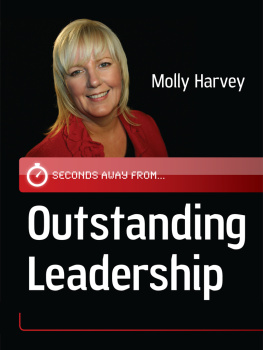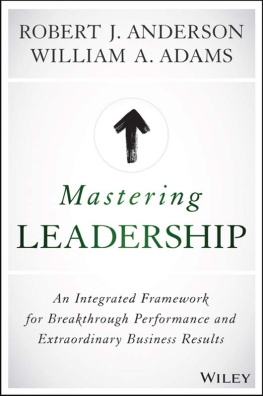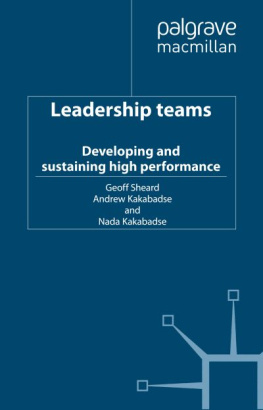Edward Peck - Performing Leadership
Here you can read online Edward Peck - Performing Leadership full text of the book (entire story) in english for free. Download pdf and epub, get meaning, cover and reviews about this ebook. year: 2009, publisher: Palgrave Macmillan, genre: Romance novel. Description of the work, (preface) as well as reviews are available. Best literature library LitArk.com created for fans of good reading and offers a wide selection of genres:
Romance novel
Science fiction
Adventure
Detective
Science
History
Home and family
Prose
Art
Politics
Computer
Non-fiction
Religion
Business
Children
Humor
Choose a favorite category and find really read worthwhile books. Enjoy immersion in the world of imagination, feel the emotions of the characters or learn something new for yourself, make an fascinating discovery.
- Book:Performing Leadership
- Author:
- Publisher:Palgrave Macmillan
- Genre:
- Year:2009
- Rating:5 / 5
- Favourites:Add to favourites
- Your mark:
- 100
- 1
- 2
- 3
- 4
- 5
Performing Leadership: summary, description and annotation
We offer to read an annotation, description, summary or preface (depends on what the author of the book "Performing Leadership" wrote himself). If you haven't found the necessary information about the book — write in the comments, we will try to find it.
Performing Leadership — read online for free the complete book (whole text) full work
Below is the text of the book, divided by pages. System saving the place of the last page read, allows you to conveniently read the book "Performing Leadership" online for free, without having to search again every time where you left off. Put a bookmark, and you can go to the page where you finished reading at any time.
Font size:
Interval:
Bookmark:
Performing Leadership
Also by Edward Peck and Helen Dickinson
MANAGING AND LEADING IN INTER-AGENCY SETTINGS
Also by Edward Peck
BEYOND DELIVERY: Policy Implementation as Sense-Making and Settlement (with Perri 6)
MANAGING NETWORKS OF TWENTY-FIRST CENTURY ORGANIZATIONS (with Perri 6, Nick Goodwin and Tim Freeman)
Edward Peck
Head of the College of Social Sciences and Professor of Public Services Development, University of Birmingham, UK
and
Helen Dickinson
Lecturer in Health Care Policy and Management, University of Birmingham, UK


Edward Peck and Helen Dickinson 2009
All rights reserved. No reproduction, copy or transmission of this publication may be made without written permission.
No portion of this publication may be reproduced, copied or transmitted save with written permission or in accordance with the provisions of the Copyright, Designs and Patents Act 1988, or under the terms of any licence permitting limited copying issued by the Copyright Licensing Agency, Saffron House, 610 Kirby Street, London EC1N 8TS.
Any person who does any unauthorized act in relation to this publication may be liable to criminal prosecution and civil claims for damages.
The authors have asserted their rights to be identified as the authors of this work in accordance with the Copyright, Designs and Patents Act 1988.
First published 2009 by
PALGRAVE MACMILLAN
Palgrave Macmillan in the UK is an imprint of Macmillan Publishers Limited, registered in England, company number 785998, of Houndmills, Basingstoke, Hampshire RG21 6XS.
Palgrave Macmillan in the US is a division of St Martins Press LLC,
175 Fifth Avenue, New York, NY 10010.
Palgrave Macmillan is the global academic imprint of the above companies and has companies and representatives throughout the world.
Palgrave and Macmillan are registered trademarks in the United States, the United Kingdom, Europe and other countries
ISBN-13: 978-0-230-21811-6 hardback
This book is printed on paper suitable for recycling and made from fully managed and sustained forest sources. Logging, pulping and manufacturing processes are expected to conform to the environmental regulations of the country of origin.
A catalogue record for this book is available from the British Library.
A catalogue record for this book is available from the Library of Congress.
10 9 8 7 6 5 4 3 2 1
18 17 16 15 14 13 12 11 10 09
Printed and bound in Great Britain by
CPI Antony Rowe, Chippenham and Eastbourne
Boxes
Tables
Figures
Our interest in the performance of leadership started almost ten years ago when a freelance theatre director called Kate Sinclair agreed to run some experiential sessions for participants on a leadership development programme that the first author was co-leading with Huw Richards and Deborah Davidson for senior managers in health and social care agencies in the North-West of England. Based on a combination of techniques used to build actors into theatre companies alongside voice and body work, they transpired not only to be highly enjoyable but were always reported as being helpful to participants in developing their leadership capability. They became and remain a highly regarded feature of all our subsequent programmes.
However, despite being popular and pertinent, they did not have much theoretical connection with the rest of the syllabus. Furthermore, most of the literature which discussed leadership and performance which we shall explore in more detail later did not seem to the current authors to have much depth or, upon closer inspection, was not really about performance at all (a case in point is Peter Vaills (1989) Managing as a Performing Art: new ideas for a world of chaotic change which was largely a personal reflection on the implications of complexity theory for organisations). Meeting Kate McLuskie Director of the Shakespeare Institute at the University of Birmingham provided a navigable route into the world of performance studies and to two ideas central to the argument of this book: the distinction between leadership is performance and leadership as performance; and the enactment, narrative and audience framework. These gave us a rubric around which to arrange a number of related ideas which previously had lacked focus.
Surprisingly, at least to us, many of the concepts that we encountered in performance studies were already familiar to us from our work with our Birmingham colleagues Tim Freeman and Perri 6 on the ritualistic and symbolic aspects of organisational governance. These were especially influential on our concept of leadership is performance. Simultaneously, Tim Freemans exploration of post-modernist and feminist sources pointed to some important ideas relating to performativity that came to shape our notion of leadership as performance; that is, the impact of (re)-iteration and (re)-citation that takes place in the warp and weft of organisational relationships. Together, we have written a number of papers on these topics (Peck et al., 2004b; Freeman & Peck, 2007; Peck et al., 2008; Peck et al., 2009; Freeman & Peck, 2009) which have inevitably shaped parts of this text.
Furthermore, our shared interest in what has become known as neo-Durkheimian institutional theory (NDIT) seemed to offer the prospect of rooting our notions of performing leadership in a robust and generalisable account of organisational context; despite the emphasis on context in leadership studies for most of the last hundred years, the field has not previously furnished such an account. In some respects, this book is the third in what has turned out to be a trilogy of texts in which the first author has been involved that explore the implications of applying NDIT to a range of issues in organisational studies. The first, Managing Networks of Twenty-First Century Organisations (Perri 6, Nick Goodwin, Edward Peck and Tim Freeman) was published by Palgrave Macmillan in 2006. This publisher also issued Beyond Delivery: policy implementation as sensemaking and settlement (Edward Peck and Perri 6) in the same year. We shall return to our use of NDIT in a moment.
Developing these links between anthropology, sociology and performance studies enabled us to start to fashion a theory of performing leadership that connected Kate Sinclairs experiential sessions with the more formal part of the development programmes. Furthermore, drawing on cultural studies and material from storytelling, discourse analysis, advertising and political science meant that we could flesh out the separate elements of the enactment, narrative and audience framework significantly.
It is important to note that most of the ideas in this text have been introduced to and debated with participants on our leadership development programmes; their practical value to leaders is one of the main motivations for codifying them in this text (and also explains the separate chapter on this topic in has tended to prove unsettling for participants and we have not always pursued its implications within our programmes, although this may well be more a failure of nerve on our part than on theirs. These topics have been, however, the focus of a number of conversations with Judith Smith as she completed her PhD thesis.
Next pageFont size:
Interval:
Bookmark:
Similar books «Performing Leadership»
Look at similar books to Performing Leadership. We have selected literature similar in name and meaning in the hope of providing readers with more options to find new, interesting, not yet read works.
Discussion, reviews of the book Performing Leadership and just readers' own opinions. Leave your comments, write what you think about the work, its meaning or the main characters. Specify what exactly you liked and what you didn't like, and why you think so.









